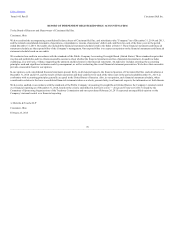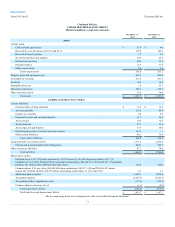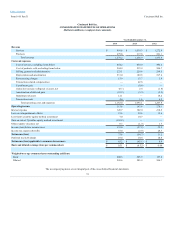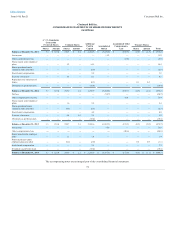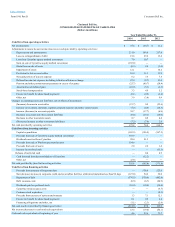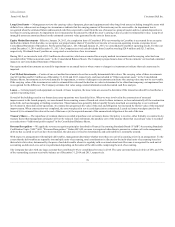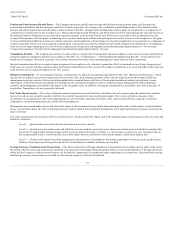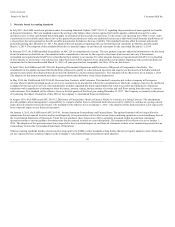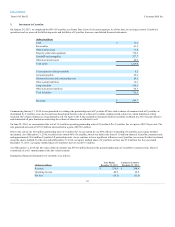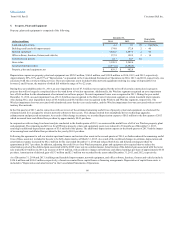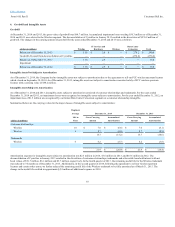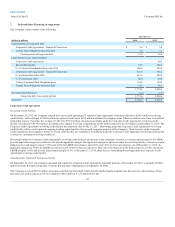Cincinnati Bell 2014 Annual Report Download - page 80
Download and view the complete annual report
Please find page 80 of the 2014 Cincinnati Bell annual report below. You can navigate through the pages in the report by either clicking on the pages listed below, or by using the keyword search tool below to find specific information within the annual report.
Table of Contents
Form 10-K Part II
Cincinnati Bell Inc.
Wireline — Revenues from local telephone, special access, internet product and entertainment services, which are billed monthly prior to performance of
service, are not recognized upon billing or cash receipt but rather are deferred until the service is provided. Long distance, switched access and other usage
based charges are billed monthly in arrears. Wireline bills service revenue in regular monthly cycles, which are spread throughout the days of the month. As
the last day of each billing cycle rarely coincides with the end of the reporting period for usage-based services such as long distance and switched access, we
must estimate service revenues earned but not yet billed. These estimates are based upon historical usage, and we adjust these estimates during the period in
which actual usage is determinable, typically in the following reporting period.
Initial billings for Wireline service connection and activation are deferred and amortized into revenue on a straight-line basis over the average customer life.
The associated connection and activation costs, to the extent of the upfront fees, are also deferred and amortized on a straight-line basis over the average
customer life.
Pricing of local voice services is generally subject to oversight by both state and federal regulatory commissions. Such regulation also covers services,
competition, and other public policy issues. Various regulatory rulings and interpretations could result in increases or decreases to revenue in future periods.
IT Services and Hardware — Professional services, including product installations, are recognized as the service is provided. Maintenance services on
telephony equipment are deferred and recognized ratably over the term of the underlying customer contract, generally one to three years.
Equipment revenue is recognized upon the completion of our contractual obligations, such as shipment, delivery, installation, or customer acceptance.
Installation service revenue is generally recognized when installation is complete. We sell equipment and installation services on both a combined and
standalone basis.
The Company is a reseller of IT and telephony equipment. For these transactions, we consider the gross versus net revenue recording criteria of ASC 605.
Based on this criteria, these equipment revenues and associated costs have generally been recorded on a gross basis, rather than recording the revenues net of
the associated costs. Vendor rebates are earned on certain equipment sales. When the rebate is earned and the amount is determinable, we recognize the rebate
as an offset to cost of products sold.
Wireless — Postpaid wireless and reciprocal compensation are billed monthly in arrears. Wireless bills service revenue in regular monthly cycles, which are
spread throughout the days of the month. As the last day of each billing cycle rarely coincides with the end of the reporting period for usage-based services
such as postpaid wireless, we estimate service revenues earned but not yet billed. Our estimates are based upon historical usage, and we adjust these estimates
during the period in which actual usage is determinable, typically in the following reporting period.
Revenue from prepaid wireless service, which is collected in advance, is not recognized upon billing or cash receipt, but rather is deferred until the service is
provided.
Wireless handset revenue and the related activation revenue are recognized when the products are delivered to and accepted by the customer, as this is
considered to be a separate earnings process from the sale of wireless services. Wireless equipment costs are also recognized upon handset sale and are
generally in excess of the related handset and activation revenue. Revenue from termination fees is recognized when collection is deemed reasonably
assured.
Data Center Colocation — During the period of time in which we included the accounts of CyrusOne in our consolidated financial statements, data center
colocation rentals were generally billed monthly in advance and some contracts had escalating payments over the non-cancellable term of the contract. If
rents escalated without the lessee gaining access to or control over additional leased space or power, and the lessee took possession of, or controlled the
physical use of the property (including all contractually committed power) at the beginning of the lease term, the rental payments by the lessee were
recognized as revenue on a straight-line basis over the term of the lease. If rents escalated because the lessee gained access to and control over additional
leased space or power, revenue was recognized in proportion to the additional space or power in the years that the lessee had control over the use of the
additional space or power.
Some of our leases were structured on a full-service gross basis in which the customer paid a fixed amount for both colocation rental and power. Other leases
provided that the customer would be billed for power based upon actual usage which was separately metered. In both cases, this revenue is presented on a
gross basis in the accompanying Consolidated Statements of Operations. Power was generally billed one month in arrears and an estimate of this revenue was
accrued in the month that the associated costs were incurred. We generally were not entitled to reimbursements for real estate taxes, insurance or other
operating expenses.
79


